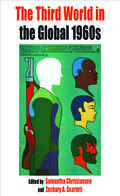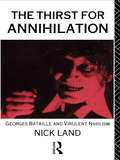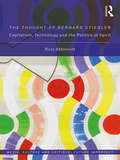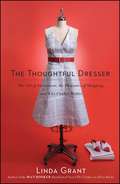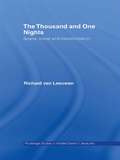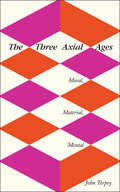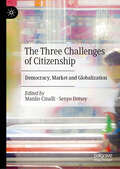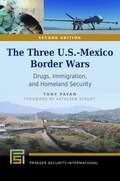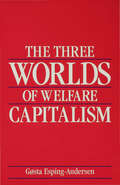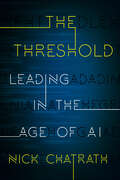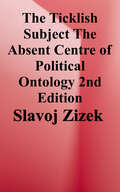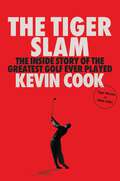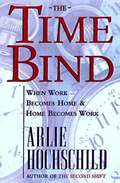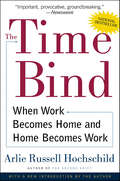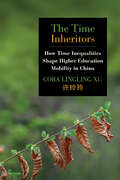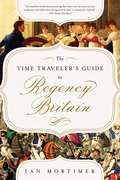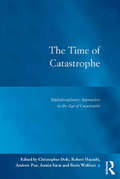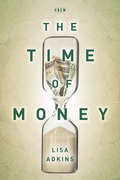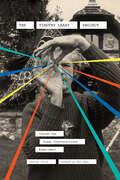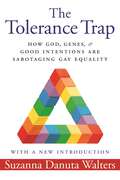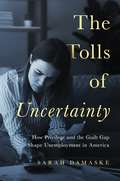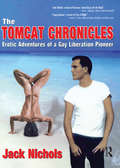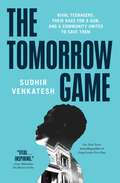- Table View
- List View
The Third World in the Global 1960s
by Zachary Scarlett Samantha ChristiansenDecades after the massive student protest movements that consumed much of the world, the 1960s remain a significant subject of scholarly inquiry. While important work has been done regarding radical activism in the United States and Western Europe, events in what is today known as the Global South-Asia, Africa, and Latin America-have yet to receive the attention they deserve. This volume inserts the Third World into the study of the 1960s by examining the local and international articulations of youth protest in various geographical, social, and cultural arenas. Rejecting the notion that the Third World existed on the periphery, it situates the events of the 1960s in a more inclusive context, building a richer, more nuanced understanding of the era that better reflects the dynamism of the period.
The Thirst for Annihilation: Georges Bataille and Virulent Nihilism
by Nick LandAn important literary and philosophical figure, Georges Bataille has had a significant influence on other French writers, such as Foucault, Derrida and Baudrillard. The Thirst for Annihilation is the first book in English to respond to Bataille's writings. In no way, though, is Nick Land's book an attempt to appropriate Bataille's writings to a secular intelligibility or to compromise with the aridity of academic discourse - rather, it is written as a communion . Theoretical issues in philosophy, sociology, psychodynamics, politics and poetry are discussed, but only as stepping stones into the deep water of textual sacrifice where words pass over into the broken voice of death. Cultural modernity is diagnosed down to its Kantian bedrock with its transcendental philosophy of the object, but Bataille's writings cut violently across this tightly disciplined reading to reveal the strong underlying currents that bear us towards chaos and dissolution - the violent impulse to escape, the thirst for annihilation.
The Thought of Bernard Stiegler: Capitalism, Technology and the Politics of Spirit (Media, Culture and Critique: Future Imperfect)
by Ross AbbinnettThis book provides a comprehensive account of the work of Bernard Stiegler, one of the most influential living social and political philosophers of the twenty-first century. Focusing on Stiegler’s thought on hyperindustrial society and the development of technological systems through which the social, economic and political life of human beings has been transformed, the author examines Stiegler’s claim that the human species is ‘originally technological’ and that to understand the evolution of human society, we must first understand the interface between human beings and technology. A study of the reciprocal development of technical instruments and human faculties, that offers a chapter-by-chapter account of how this relationship is played out in the digital, informatic and biotechnological programmes of hyperindustrial society, The Thought of Bernard Stiegler develops Stiegler’s idea of technology as a pharmakon: a network of systems that provoke both existential despair and unprecedented modes of aesthetic, literary and philosophical creativity that can potentially revitalize the political culture of human beings. As such, it will appeal to social and political theorists and philosophers concerned with our postmodern inheritance.
The Thoughtful Dresser
by Linda Grant"You can't have depths without surfaces," says Linda Grant in her lively and provocative new book, The thoughtful Dresser, a thinking woman's guide to what we wear. For centuries, an interest in clothes has been dismissed as the trivial pursuit of vain, empty-headed women. Yet, clothes matter, whether you are interested in fashion or not, because how we choose to dress defines who we are. How we look and what we wear tells a story. Some stories are simple, like the teenager trying to fit in, or the woman turning fifty renouncing invisibility. Some are profound, like that of the immigrant who arrives in a new country and works to blend in by changing the way she dresses, or of the woman whose hat saved her life in Nazi Germany.The Thoughtful Dresser celebrates the pleasure of adornment and is an elegant meditation on our relationship with what we wear and the significance of clothes as the most intimate but also public expressions of our identity.
The Thoughtful Dresser: The Art of Adornment, the Pleasures of Shopping, and Why Clothes Matter
by Linda Grant"You can't have depths without surfaces," says Linda Grant in her lively and provocative new book, The thoughtful Dresser, a thinking woman's guide to what we wear. For centuries, an interest in clothes has been dismissed as the trivial pursuit of vain, empty-headed women. Yet, clothes matter, whether you are interested in fashion or not, because how we choose to dress defines who we are. How we look and what we wear tells a story. Some stories are simple, like the teenager trying to fit in, or the woman turning fifty renouncing invisibility. Some are profound, like that of the immigrant who arrives in a new country and works to blend in by changing the way she dresses, or of the woman whose hat saved her life in Nazi Germany.The Thoughtful Dresser celebrates the pleasure of adornment and is an elegant meditation on our relationship with what we wear and the significance of clothes as the most intimate but also public expressions of our identity.
The Thousand and One Nights: Space, Travel and Transformation (Routledge Studies in Middle Eastern Literatures)
by Richard van LeeuwenThis volume discusses The Thousand and One Nights' themes of space and travel showing how they are used not only as a setting in which the story unfolds, but also as the dynamic force which propels the heroes and the story to the final dénouement. These events often symbolize a process of transformation, in which the hero has to search for his destined role or strive to attain the object of his desire. In this way, themes of travel are the narrative backbone of stories of various genres including love, religion, magic and adventure. This book not only gives a fresh approach to many stories of the collection, but also proposes new insights in the nature of The Thousand and one Nights as a self-reflexive narrative and is essential reading for scholars of Arabic literature.
The Three Axial Ages: Moral, Material, Mental
by John TorpeyHow should we think about the “shape” of human history since the birth of cities, and where are we headed? Sociologist and historian John Torpey proposes that the “Axial Age” of the first millennium BCE, when some of the world’s major religious and intellectual developments first emerged, was only one of three such decisive periods that can be used to directly affect present social problems, from economic inequality to ecological destruction. Torpey’s argument advances the idea that there are in fact three “Axial Ages,” instead of one original Axial Age and several subsequent, smaller developments. Each of the three ages contributed decisively to how humanity lives, and the difficulties it faces. The earliest, or original, Axial Age was a moral one; the second was material, and revolved around the creation and use of physical objects; and the third is chiefly mental, and focused on the technological. While there are profound risks and challenges, Torpey shows how a worldview that combines the strengths of all three ages has the potential to usher in a period of exceptional human freedom and possibility.
The Three Challenges of Citizenship: Democracy, Market and Globalization
by Manlio Cinalli Senyo DotseyThis book emphasizes the concept of citizenship as a driving force behind navigating the complexities of our modern world, as it explores the full potential and power of citizenship in relation to democracy, the market, and globalization. The book takes readers on a thought-provoking journey through the intricate interplay between citizenship and these three fundamental aspects of our contemporary world. As society grapples with existential threats ranging from democratic backsliding and economic inequality to the complex realities of globalization, this edited volume seeks to transcend conventional notions of citizenship. With populism thriving and traditional nation-state boundaries blurring, the authors argue for a redefined, proactive understanding of citizenship—one that encourages active participation, critical engagement, and robust discourse. This compelling read will intrigue scholars, researchers, graduate students, policymakers and practitioners seeking to deepen their understanding of the dynamic interplay between citizenship and current global issues. By bridging theoretical insights with real-world implications, this collection fosters an interdisciplinary dialogue that enriches scholarly engagement.
The Three U.S.-Mexico Border Wars: Drugs, Immigration, and Homeland Security (2nd Edition) (Praeger Security International)
by Tony PayanThis book addresses the three central issues that continue to dominate the U.S.-Mexico relationship today: drugs, immigration, and security. A required reading for many, including political and policy decision makers, civic activists and youth (the current and next generation of taxpayers concerned about fiscal responsibility), and multiple peoples in the borderlands. Readers will gain insight from this realistic narrative of the border.
The Three Worlds of Welfare Capitalism
by Gosta Esping-AndersenEsping-Andersen distinguishes three major types of welfare state, connecting these with variations in the historical development of different Western countries. He argues that current economic processes, such as those moving toward a postindustrial order, are shaped not by autonomous market forces but by the nature of states and state differences.
The Threshold: Leading in the Age of AI
by Nick ChatrathAccomplished leadership consultant Nick Chatrath offers a revolutionary framework for how leaders in all kinds of organizations can adapt to the new age of technology, like ChatGPT—the Age of AI— by leaning into the qualities and skills that make us uniquely human. For readers of Yuval Noah Harari’s 21 Lessons for the 21st Century and Max Tegmark’s Life 3.0, The Threshold is a bold new way to think about human, emotionally intelligent leadership right now as we stand at the threshold of AI superintelligence.We are living in a new age: the Age of AI. With developments emerging every day, Artificial Intelligence will soon surpass most human competencies, and as a result drastically transform technology’s role in our day-to-day world. The solution for organizational leaders is not to become more like computers. In order for our organizations to survive as we stand at the threshold of a new era, we must tap into the qualities that make us uniquely human.In the face of increasingly intelligent technology, old models of leadership are becoming obsolete. In The Threshold: Leading in the Age of AI, accomplished leadership consultant Nick Chatrath interweaves an analysis of antiquated leadership models—the ones that leave AI-Era organizations exposed and ineffective with colleagues frustrated, unmotivated, and burnt-out—with his newly developed strategies for more effective “threshold” leadership methods. Supported with anecdotes, research, and a practical toolkit, The Threshold demonstrates that adaptive, effective organizations can be built with human, emotional intelligence: cultivating stillness, nurturing independent thinking, finding rhythms of rest and performance, and raising leadership consciousness. With a basis in the ideas and practices that have shaped our organizations in the past, The Threshold illuminates how accessing advanced stages of human development can be both competitive and harmonious with AI’s growing insinuation into our working world.
The Ticklish Subject: The Absent Centre of Political Ontology (The Essential Zizek Series)
by Slavoj ZizekSlavoj Zizek, the maverick philosopher, author of over 30 books, acclaimed as the "Elvis of cultural theory", and today's most controversial public intellectual. His work traverses the fields of philosophy, psychoanalysis, theology, history and political theory, taking in film, popular culture, literature and jokes--all to provide acute analyses of the complexities of contemporary ideology as well as a serious and sophisticated philosophy. His recent films The Pervert's Guide to the Cinema and Zizek! reveal a theorist at the peak of his powers and a skilled communicator. <p><p>Now Verso is making his classic titles, each of which stand as a core of his ever-expanding life's work, available as new editions. Each is beautifully re-packaged, including new introductions from Zizek himself. Simply put, they are the essential texts for understanding Zizek's thought and thus cornerstones of contemporary philosophy. <p><p>The Ticklish Subject: The Absent Centre of Political Ontology: A specter is haunting Western thought, the specter of the Cartesian subject. In this book Slavoj Zizek unearths a subversive core to this elusive specter, and finds within it the indispensable philosophical point of reference for any genuinely emancipatory project.
The Tiger Slam: The Inside Story of the Greatest Golf Ever Played (Tiger Woods in 2000–2001)
by Kevin Cook&“A captivating tale.&” —Kirkus Reviews • &“Masterful.&” —Mark Frost • &“The rare must-read.&” —Alan Shipnuck • &“This book is truly as grand as it gets.&” —Jim NantzTwenty-five years ago, Tiger Woods achieved the greatest feat in golf history: the &“Tiger Slam.&” Now, for the first time, the award-winning author of Tommy&’s Honor delivers a riveting account of Tiger at his most brilliant—dominating the game in a way we will never see again.In 1997, as every schoolchild knows, Tiger Woods won the Masters by the largest margin in history, becoming the first Black player to win a major championship. Four years later, the world watches with breathless anticipation as he returns to Augusta National, aiming for a milestone no other golfer has ever achieved: four professional Grand Slam triumphs in a row. In The Tiger Slam, Kevin Cook delivers a gripping, inside-the-ropes account of an astonishing streak of victories that left Woods&’s rivals scrambling to keep up. Readers will hear from many of golf &’s biggest names—Tiger&’s caddie, his coach, his opponents, his idols, and others, all offering fresh insight into the electrifying highs of his victories and the obstacles on and off the course that threatened his relentless pursuit of perfection. We join Tiger at the beginning of his Slam: the 2000 US Open at Pebble Beach. In a notoriously grueling tournament designed to bring golfers to their knees, who could even dream of winning by a record margin of fifteen strokes? Tiger could. We follow him to the hallowed grounds of St. Andrews a few weeks later for the 2000 Open Championship, where he transforms his game to meet the singular demands of the links. Still only twenty-four, he leaves the Old Course as the youngest player ever to complete a career Grand Slam. We proceed with Tiger to the 2000 PGA Championship at Valhalla, where he fights a spectacular Sunday duel with a player he grew up idolizing, ending with a playoff that changes the course of golf history. Finally, we return to legendary Augusta National, site of his record-breaking first major championship, to see if he can be the first to sweep all four majors. Dogged by reports of an early-season slump, facing a supposedly &“Tiger-proofed&” course, golf&’s superstar tees off against his two fiercest adversaries in an unforgettable final round. The Tiger Slam is the epitome of greatness in sport, a feat as exhilarating today as it was twenty-five years ago. In fact, it&’s even more so, now that we know we&’ll never see its like again—such dominance is unthinkable in modern golf&’s era of parity. Kevin Cook invites us to close our eyes and remember a young champion at the peak of his powers: unmatched raw strength, single-minded focus, strategic genius, and utter fearlessness. The Tiger Slam takes readers behind the scenes in the thrilling months when Tiger Woods took an ancient game to new heights.
The Time Bind: When Work Becomes Home and Home Becomes Work
by Arlie Russell HochschildThe national bestseller that put "work/family balance" in the headlines and on the White House agenda. Hailed as the decade's most influential study of our work/family crisis.
The Time Bind: When Work Becomes Home and Home Becomes Work
by Arlie Russell HochschildThe national bestseller that put "work/family balance" in the headlines and on the White House agenda, with a new introduction by the author.When The Time Bind was first published in 1997, it was hailed as the decade's most influential study of our work/family crisis. In the short time since, the crisis has only become more acute.Arlie Russell Hochschild, bestselling author of The Second Shift, spent three summers at a Fortune 500 company interviewing top executives, secretaries, factory hands, and others. What she found was startling: Though every mother and nearly every father said "family comes first," few of these working parents questioned their long hours or took the company up on chances for flextime, paternity leave, or other "family friendly" policies. Why not? It seems the roles of home and work had reversed: work was offering stimulation, guidance, and a sense of belonging, while home had become the place in which there was too much to do in too little time. Today Hochschild's findings are more relevant than ever. As she shows in her new introduction, the borders between family and work have become even more permeable. With the Internet extending working hours at home and offices offering domestic enticements -- free snacks, soft music -- to keep employees later at their jobs, The Time Bind stands as an increasingly important warning about the way we live and work.
The Time Divide: Work, Family, and Gender Inequality (The Family and Public Policy)
by Kathleen Gerson Jerry A. JacobsIn a panoramic study that draws on diverse sources, Jerry A. Jacobs and Kathleen Gerson explain why and how time pressures have emerged and what we can do to alleviate them. In contrast to the conventional wisdom that all Americans are overworked, they show that time itself has become a form of social inequality that is dividing Americans in new ways—between the overworked and the underemployed, women and men, parents and non-parents. They piece together a compelling story of the increasing mismatch between our economic system and the needs of American families, sorting out important trends such as the rise of demanding jobs and the emergence of new pressures on dual earner families and single parents. Comparing American workers with their European peers, Jacobs and Gerson also find that policies that are simultaneously family-friendly and gender equitable are not fully realized in any of the countries they examine. As a consequence, they argue that the United States needs to forge a new set of solutions that offer American workers new ways to integrate work and family life.
The Time Inheritors: How Time Inequalities Shape Higher Education Mobility in China (SUNY series, Education in Global Perspectives)
by Cora Lingling XuReveals the role of time in reproducing inequalities as students navigate rural-to-urban, cross-border, and transnational higher education.Can a student inherit time? What difference does time make to their educational journeys and outcomes? The Time Inheritors draws on nearly a decade of field research with more than one hundred youth in China to argue that intergenerational transfers of privilege or deprivation are manifested in and through time. Comparing experiences of rural-to-urban, cross-border, and transnational education, Cora Lingling Xu shows how inequalities in time inheritance help drive deeply unequal mobility. With its unique focus on time, nuanced comparative analysis, and sensitive ethnographic engagement, The Time Inheritors opens new avenues for understanding the social mechanisms shaping the future of China and the world.
The Time Traveler's Guide to Regency Britain: A Handbook for Visitors to 1789–1830
by Ian MortimerA vivid and immersive history of Georgian England that gives its reader a firsthand experience of life as it was truly lived during the era of Jane Austen, Percy Bysshe Shelley, and the Duke of Wellington.This is the age of Jane Austen and the Romantic poets; the paintings of John Constable and the gardens of Humphry Repton; the sartorial elegance of Beau Brummell and the poetic licence of Lord Byron; Britain's military triumphs at Trafalgar and Waterloo; the threat of revolution and the Peterloo massacre. In the latest volume of his celebrated series of Time Traveler's Guides, Ian Mortimer turns to what is arguably the most-loved period in British history: the Regency, or Georgian England. A time of exuberance, thrills, frills and unchecked bad behavior, it was perhaps the last age of true freedom before the arrival of the stifling world of Victorian morality. At the same time, it was a period of transition that reflected unprecedented social, economic, and political change. And like all periods in history, it was an age of many contradictions—where Beethoven's thundering Fifth Symphony could premier in the same year that saw Jane Austen craft the delicate sensitivities of Persuasion. Once more, Ian Mortimer takes us on a thrilling journey to the past, revealing what people ate, drank, and wore; where they shopped and how they amused themselves; what they believed in, and what they were afraid of. Conveying the sights, sound,s and smells of the Regency period, this is history at its most exciting, physical, visceral—the past not as something to be studied but as lived experience.
The Time of Catastrophe: Multidisciplinary Approaches to the Age of Catastrophe (Law, Justice and Power)
by Austin Sarat Christopher Dole Robert Hayashi Andrew PoeIf catastrophes are, by definition, exceptional events of such magnitude that worlds and lives are dramatically overturned, the question of timing would pose a seemingly straightforward, if not redundant question. The Time of Catastrophe demonstrates the analytic productiveness of this question, arguing that there is much to be gained by interrogating the temporal conceits of conventional understandings of catastrophe and the catastrophic. Bringing together a distinguished, interdisciplinary group of scholars, the book develops a critical language for examining 'catastrophic time', recognizing the central importance of, and offering a set of frameworks for, examining the alluring and elusive qualities of catastrophe. Framed around the ideas of Agamben, Kant and Benjamin, and drawing on philosophy, history, law, political science, anthropology and the arts, this volume seeks to demonstrate how the question of 'catastrophic time' is in fact a question about something much more than the frequency of disasters in our so-called 'Age of Catastrophe'.
The Time of Money (Currencies: New Thinking for Financial Times)
by Lisa AdkinsSpeculation is often associated with financial practices, but The Time of Money makes the case that it not be restricted to the financial sphere. It argues that the expansion of finance has created a distinctive social world, one that demands a speculative stance toward life in general. Replacing a logic of extraction, speculation changes our relationship to time and organizes our social worlds to maximize the productive capacities of populations around flows of money for finance capital. Speculative practices have become a matter of survival, and defining features of our age are hardwired to their operations—stagnant wages, indebtedness, the centrality of women's earnings to the household, workfarism, and more. Examining five features of our contemporary economy, Lisa Adkins reveals the operations of this speculative rationality. Moving beyond claims that indebtedness is intrinsic to contemporary life and vague declarations that the social world has become financialized, Adkins delivers a precise examination of the relation between finance and society, one that is rich in empirical and analytical detail.
The Timothy Leary Project: Inside the Great Counterculture Experiment
by Jennifer UlrichThe life of Timothy Leary is examined through papers and correspondence preserved in his archive.The first collection of Timothy Leary’s (1920–1996) selected papers and correspondence opens a window on the ideas that inspired the counterculture of the 1960s and the fascination with LSD that continues to the present. The man who coined the phrase “turn on, tune in, drop out,” Leary cultivated interests that ranged across experimentation with hallucinogens, social change and legal reform, and mysticism and spirituality, with a passion to determine what lies beyond our consciousness. Through Leary’s papers, the reader meets such key figures as Allen Ginsberg, William S. Burroughs, Ken Kesey, Marshall McLuhan, Aldous Huxley, John Lennon and Yoko Ono, and Carl Sagan. Author Jennifer Ulrich organizes this rich material into an annotated narrative of Leary’s adventurous life, an epic quest that had a lasting impact on American culture.“A fascinatingly intimate record of how this brilliant, courageous, and awed genius changed our world.” —Michael Backes, author of the bestselling Cannabis Pharmacy“[These notes and letters] portray a brilliant and restless genius who never feared to make mistakes or change his views.” —Ralph Metzner, PhD, coauthor, with Leary and Alpert, of The Psychedelic Experience“Hopefully, these letters show people the real Timothy Leary—an inveterate letter writer who took the time to engage with all kinds of people. Few of us would be as generous.” —R. U. Sirius, cofounder of Mondo 2000 and coauthor of Transcendence
The Tolerance Trap: How God, Genes, and Good Intentions are Sabotaging Gay Equality (Intersections #3)
by Suzanna Danuta WaltersFrom Gleeto gay marriage, from lesbian senators to out gay Marines, we have undoubtedlyexperienced a seismic shift in attitudes about gays in American politics andculture. Our reigning national story isthat a new era of rainbow acceptance is at hand. But dig a bit deeper, and thisseemingly brave new gay world is disappointing. For all of the undeniable changes,the plea for tolerance has sabotaged the full integration of gays into Americanlife. Same-sex marriage is unrecognized and unpopular in the vast majority ofstates, hate crimes proliferate, and even in the much vaunted “gay friendly”world of Hollywood and celebrity culture, precious few stars are openly gay.In TheTolerance Trap, Suzanna Walterstakes on received wisdom about gay identities and gay rights, arguing that weare not “almost there,” but on thecontrary have settled for a watered-down goal of tolerance and acceptancerather than a robust claim to full civil rights. After all, we tolerate unpleasant realities: medicinewith strong side effects, a long commute, an annoying relative. Drawing on avast array of sources and sharing her own personal journey, Walters shows howthe low bar of tolerance demeans rather than ennobles both gays and straightsalike. Her fascinating examination covers the gains in political inclusion andthe persistence of anti-gay laws, the easy-out sexual freedom of queer youthand the suicides and murders of those in decidedly intolerant environments. Shechallenges both “born that way” storylines that root civil rights in biology,and “god made me that way” arguments that similarly situate sexuality as innateand impervious to decisions we make to shape it. A sharp and provocative cultural critique, thisbook deftly argues that a too-soon declaration of victory short-circuits fullequality and deprives us all of the transformative possibilities of fullintegration. Tolerance is not the endgoal, but a dead end. In The ToleranceTrap, Walters presents a complicated snapshot of a world-shifting moment inAmerican history—one that is both a wake-up call and a call to arms for anyoneseeking true equality.
The Tolls of Uncertainty: How Privilege and the Guilt Gap Shape Unemployment in America
by Sarah DamaskeAn indispensable investigation into the American unemployment system and the ways gender and class affect the lives of those looking for workThrough the intimate stories of those seeking work, The Tolls of Uncertainty offers a startling look at the nation’s unemployment system—who it helps, who it hurts, and what, if anything, we can do to make it fair. Drawing on interviews with one hundred men and women who have lost jobs across Pennsylvania, Sarah Damaske examines the ways unemployment shapes families, finances, health, and the job hunt. Damaske demonstrates that commonly held views of unemployment are either incomplete or just plain wrong. Shaped by a person’s gender and class, unemployment generates new inequalities that cast uncertainties on the search for work and on life chances beyond the world of work, threatening opportunity in America.Following in depth the lives of four individuals over the course of their unemployment experiences, Damaske offers insights into how the unemployed perceive their relationship to work. She reveals the high levels of blame that women who have lost jobs place on themselves, leading them to put their families’ needs above their own, sacrifice their health, and take on more tasks inside the home. This “guilt gap” illustrates how unemployment all too often exacerbates existing differences between men and women. Class privilege, too, gives some an advantage, while leaving others at the mercy of an underfunded unemployment system. Middle-class men are generally able to create the time and space to search for good work, but many others are bogged down by the challenges of poverty-level unemployment benefits and family pressures and fall further behind.Timely and engaging, The Tolls of Uncertainty posits that a new path must be taken if the nation’s unemployed are to find real relief.
The Tomcat Chronicles: Erotic Adventures of a Gay Liberation Pioneer
by Jack NicholsAn uncensored road trip through gay American life in the early sixties!Jack Nichols is now known as a founding father of the gay and lesbian liberation movement, editor of GAY (the first gay weekly newspaper), co-founder of the Mattachine Societies of Washington, DC, and Florida, and a warrior who broke ground for gay equality. In his early twenties, however, he was dedicated to romance, ardor, and wanderlust-living the life of a gypsy and making love with abandon. "MORE EXCITING THAN THE WILDEST FICTION. . . . Jack takes his reader on the road with him (Jack often hitchhiking in only T-shirt and jeans) where he encounters, beds down (and sometimes hustles) dozens of attractive 'numbers' who come his way."- Donn Teal, Author of The Gay Militants: 1971 & 1994"This might be called Jack Nichols' version of Kerouac's beat classic On the Road. With a variety of companions, and with little money in his pocket, in the early 60s, he drove, hitchhiked, rode buses, and even walked for a couple of long stretches from Washington, DC, to New York and then through West Virginia, Pennsylvania, Ohio, Michigan, and Illinois. He recalls in considerable detail a variety of individuals with whom he had erotic encounters. The title The Tomcat Chronicles is fully descriptive."- Vern L. Bullough, PhD, RN, Editor of Before Stonewall: Activists for Gay and Lesbian Rights in Historical Context"Jack Nichols, the gay liberation pioneer, has been a lifelong friend who helped to illuminate my concept of homophobia. Oscar Wilde believed one's life should be a work of art. Jack's life, which has always combined courage, social awareness and sexual passion, is certainly such a work."- George Weinberg, PhD, Author of Society and the Healthy Homosexual and 13 other books (the psychotherapist credited with coining the term homophobia)"THE VIVID DETAIL AND GRACEFUL PROSE THAT CHARACTERIZE THE WRITING OF JACK NICHOLS open a window into a time long before gay men appeared weekly on tv or before anti-sodomy laws had been banned."- Rodger Streitmatter, PhD, Author of Unspeakable: The Rise of the Gay and Lesbian Press in America"The Tomcat Chronicles is a gay pioneer's version of City of Night."- James T. Sears, PhD, Author of Rebels, Rubyfruit, and Rhinestones: Queering Space in the Stonewall South; Editor of the Journal of Gay & Lesbian Issues in Education (from the Foreword)
The Tomorrow Game: Rival Teenagers, Their Race for a Gun, and a Community United to Save Them
by Sudhir VenkateshA New York Times bestselling author&’s gripping account of a Chicago community coming together to save a group of teenagers from gun violence.In the tradition of works like Random Family and Behind the Beautiful Forevers, Sudhir Venkatesh&’s The Tomorrow Game is a deeply reported chronicle of families surviving in a Southside Chicago community. At the heart of the story are two teenagers: Marshall Mariot, an introverted video gamer and bike rider, and Frankie Paul, who leaves foster care to direct his cousin&’s drug business while he&’s in prison. Frankie devises a plan to attack Marshall and his friends—it is his best chance to showcase his toughness and win respect for his crew. Catching wind of the plan, Marshall and his friends decide they must preemptively go after Frankie&’s crew to defend their honor. The pressure mounts as both groups of teens race to find a gun and strike first. All the while, the community at large—a cast that includes the teens&’ families, black market gun dealers, local pastors, a bodega owner, and a veteran beat cop—try their best to defuse the conflict and keep the kids alive. Based on Venkatesh&’s three decades of immersion in Chicago&’s Southside, and as propulsive as a novel, The Tomorrow Game is a nuanced, timely look at the toll that poverty and gun violence take on families and their communities.
